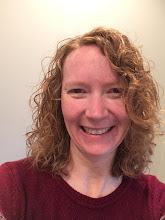I apologize for the sporadic posts lately. I'm still trying to get into the groove of my schedule with two kids now instead of one, especially since I am nursing the youngest one.
But anyway, I am taking a poetry class at the college. In one of the books we read, Fooling with Words, Shirley Geok-Lin Lim made the comment: "I share my poems, I guess, with unkonwn people, and I don't share them with the people I'm most intimate with [husband, children, etc.]...There's a part of me that I would like to keep sheltered that comes out in language, and once it's out in language, it's shared with the rest of the world. But I want to shelter it from the people I spend my life with."
My professor made the comment that he did not understand her statement until I responded that I knew exactly how she felt. I too rarely share my writing with my husband, parents, or siblings - at least until it has been polished up by other people. It's a little bit paradoxical because I have come to the point where I invite criticism from lots of outside parties in order to make my writing better. I have come to the realization that my reasoning is twofold as to why my intimates are not some of those invited parties.
First of all, I have toughened my skin to the point that I can accept negative criticism and not take it personally. However, my family members mean so much to me that if they did not like something, or how something was written, I don't know that I could distance myself from their criticism so easily. Essentially I am afraid of their disapproval.
Secondly, I have realized that I am afraid of how well my family knows me. Much of my writing is based upon personal experience, but I take creative license with it. And sometimes it is all about my creativity. I worry that my family will take something I have written and read into it something about me as a person that is not true. Like I don't want my family to think my feelings or actions are as extreme as some of my characters', but they know me well enough and could recognize the other elements of myself in my writing that it's possible they would do exactly that. And because of it, I fear strained or awkward relationships based on misunderstandings.
So I guess I look forward to the day in my writing career where I am confident enough in myself that I can share my writing with anyone, including my intimates. I also look forward to the day when my family can let my writing stand on its own without judging me based upon it. And it's possible that I am not giving them enough credit, that they already see my writing as separate from myself. But I'm not ready to take that chance...yet.
But anyway, I am taking a poetry class at the college. In one of the books we read, Fooling with Words, Shirley Geok-Lin Lim made the comment: "I share my poems, I guess, with unkonwn people, and I don't share them with the people I'm most intimate with [husband, children, etc.]...There's a part of me that I would like to keep sheltered that comes out in language, and once it's out in language, it's shared with the rest of the world. But I want to shelter it from the people I spend my life with."
My professor made the comment that he did not understand her statement until I responded that I knew exactly how she felt. I too rarely share my writing with my husband, parents, or siblings - at least until it has been polished up by other people. It's a little bit paradoxical because I have come to the point where I invite criticism from lots of outside parties in order to make my writing better. I have come to the realization that my reasoning is twofold as to why my intimates are not some of those invited parties.
First of all, I have toughened my skin to the point that I can accept negative criticism and not take it personally. However, my family members mean so much to me that if they did not like something, or how something was written, I don't know that I could distance myself from their criticism so easily. Essentially I am afraid of their disapproval.
Secondly, I have realized that I am afraid of how well my family knows me. Much of my writing is based upon personal experience, but I take creative license with it. And sometimes it is all about my creativity. I worry that my family will take something I have written and read into it something about me as a person that is not true. Like I don't want my family to think my feelings or actions are as extreme as some of my characters', but they know me well enough and could recognize the other elements of myself in my writing that it's possible they would do exactly that. And because of it, I fear strained or awkward relationships based on misunderstandings.
So I guess I look forward to the day in my writing career where I am confident enough in myself that I can share my writing with anyone, including my intimates. I also look forward to the day when my family can let my writing stand on its own without judging me based upon it. And it's possible that I am not giving them enough credit, that they already see my writing as separate from myself. But I'm not ready to take that chance...yet.

Interesting insight. I completely understand your point of view. Of course, I have multiple novels that Betty doesn't like, which I just have to live with. It helps me understand the difference in audiences and people's different tastes.
ReplyDelete